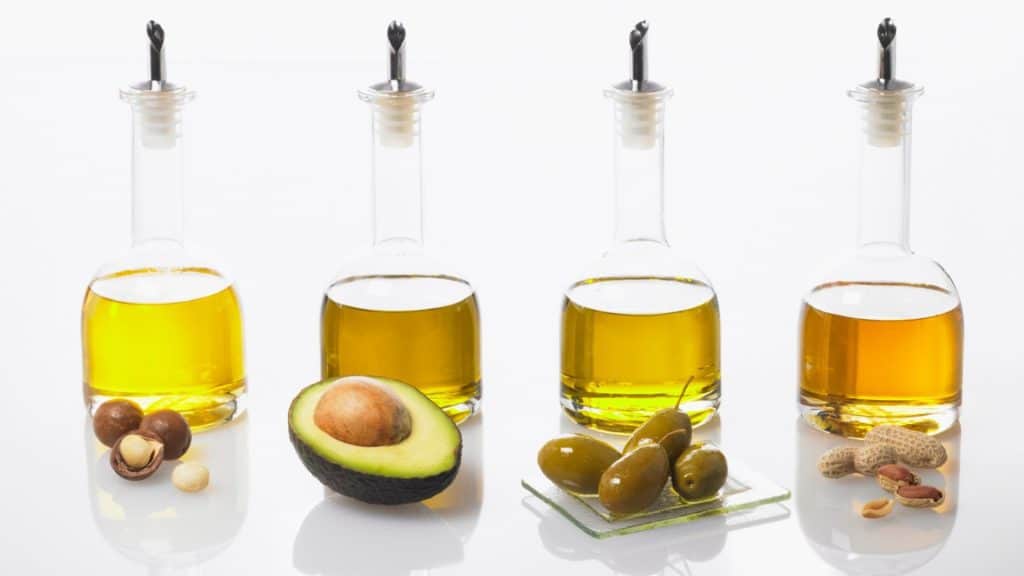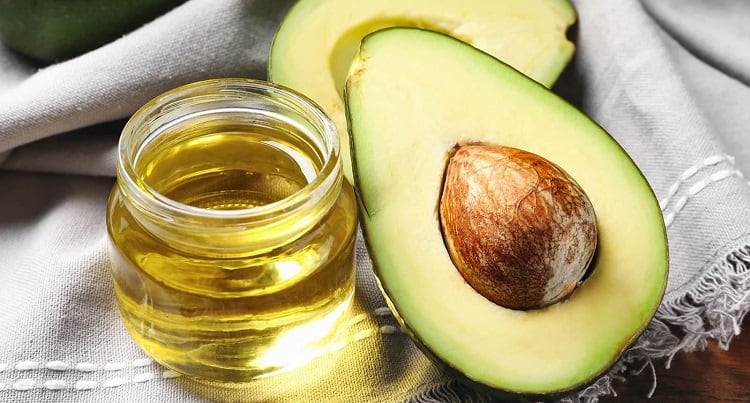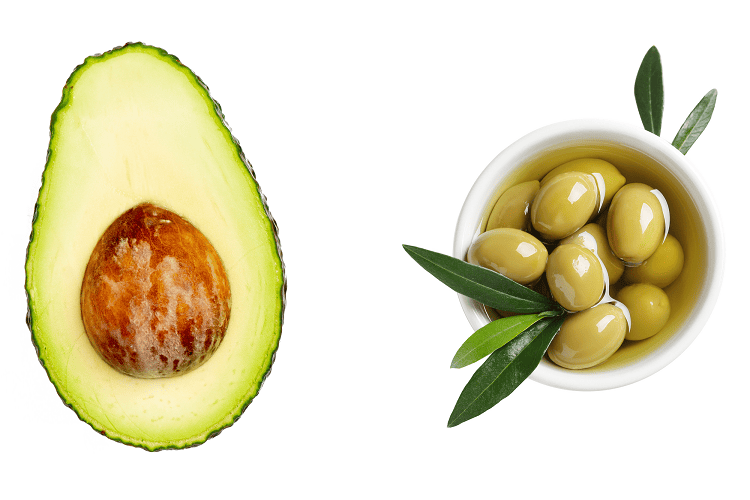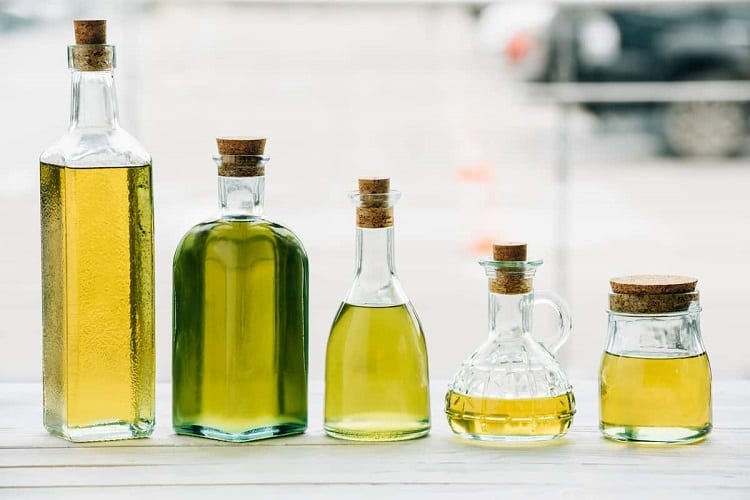
Avocado Oil Vs Olive Oil: Which One Is Better?
There are many different types of oils you can use to cook with, but chances are that when you think about healthy oils your mind immediately goes to olive oil.
This oil has become very popular as part of a Mediterranean diet, and it’s delicious to drizzle over your salad or when you want to dip bread in it. That said, it’s not the only healthy oil to add to your diet.
Is avocado oil a good alternative to olive oil?
Avocado oil is similar to olive oil in many respects, such as when it comes to its nutritional profile.
However, there is lots to know about these two oils and how they compare. Which one is healthier for you, and which one should you cook with? Let’s settle the avocado oil vs olive oil debate once and for all!
What Is Olive Oil?

Olive oil is made from the olives of the olive tree. The olives are harvested, then mashed. Their oil is separated from their flesh and then cold-pressed. There are many health benefits linked to olive oil. These include the following:
- Olive oil has been found to be good for heart health. One review found that consuming two tablespoons of extra virgin olive oil every day can decrease your risk of cardiovascular inflammation and disease.
- Olive oil contains monounsaturated fats called oleic acid, which lower inflammation and are thought to have healing effects on genes linked to cancer.
- Olive oil also contains antioxidants, such as oleocanthal which provides anti-inflammatory effects. It’s said that this antioxidant works in a similar way to anti-inflammatory medication such as ibuprofen.
- Extra virgin oil lowers inflammation and protects LDL cholesterol from oxidation, which helps to keep your blood vessels healthy.
To gain the most benefits from olive oil, make sure you buy extra virgin olive oil. This is because it maintains antioxidants and bioactive compounds found in olives, so it’s healthier than refined olive oil varieties.
What Is Avocado Oil?

Avocado oil is made from pressing avocados. Avocados are harvested, before having their pits and skins removed. Then they’re mashed up before their oil is separated from the rest of the product. After being cold-pressed, the avocado oil is bottled.
Avocado oil has a mild taste and high smoke point, both of which make it popular for use as a cooking oil.
Like olive oil, avocado oil has many health benefits. These include the following:
- The vitamins and antioxidants found in avocado oil are said to soothe dry, flaky, and irritated skin linked to health conditions such as psoriasis and eczema.
- Research has found that oleic acid and essential fatty acids in avocado oil help to encourage collagen synthesis, and this helps your body to produce connective tissue.
- Avocado oil has unsaturated fatty acids which are linked to heart health. In a study, when people were given a control meal containing butter or a test meal of avocado oil and then had their blood tested, it was found that the test meal participants had lower levels of bad LDL cholesterol and blood sugar as compared to those who’d eaten the butter.
- Avocado oil contains various antioxidants, such as tocopherols, plant sterols, and carotenoids, that kill free radicals and protect your health. Free radicals are harmful because they damage parts of cells, such as proteins and DNA.
As with olive oil, you can choose between refined and extra-virgin avocado oil, which is the better choice. Extra-virgin avocado oil has similar properties to actual avocados, and it has a fatty, buttery flavor. Refined avocado oil, on the other hand, has undergone processes of bleaching the oil which decreases the strength of flavor.
Pro tip: If you’re not sure if avocado oil is refined or not, check its color. It should be green as yellow shows that the oil has undergone a refining process.
Avocado Oil Vs Olive Oil: What Are Their Differences?

Both of these healthy oils, when unrefined, maintain some of the flavor as well as color of the fruits they’re made from, which means they both have a green hue to their appearance. Let’s compare the differences between avocado oil and olive oil according to different categories.
Smoke Point
An oil’s smoke point is the temperature at which the oil begins to degrade, lose its flavor, and release free radicals. Avocado oil has a higher smoke point than olive oil.
Avocado oil has a smoke point that’s higher than 482 degrees Fahrenheit while olive oil has a smoke point of 375 degrees Fahrenheit. This means that avocado oil won’t smoke and burn as fast. This is why it’s better to use avocado oil if you’re cooking food at very high temperatures, such as if you’re searing, grilling, or baking food.
You should also use avocado oil instead of olive oil if you’re sautéing or deep-frying food.
As a result of its smoke point, you should stick to using olive oil when it’s cooler in temperature, such as by drizzling it on salads and adding it to dips.
Nutrients
As we’ve already seen, both avocado oil and olive oil have nutrients that are beneficial to your health. Both oils are considered good fats because they contain large quantities of monounsaturated fatty acids, and they both contain antioxidants that fight free radicals in the body and therefore prevent oxidative stress as well as inflammation.
Monounsaturated fats are linked to a reduced risk of heart disease, lower blood pressure, and healthy cholesterol levels. These healthy fats are also useful in that they allow your body to better absorb fat-soluble nutrients that are present in your meals.
Both types of oil have similar nutritional ingredients. The main difference in the nutrition provided by these oils is their Vitamin E content. Olive oil contains more Vitamin E. A study found that a tablespoon of olive oil contains 33 percent of your recommended daily allowance of Vitamin E, whereas a tablespoon of avocado oil contains 23 percent.

Flavor
Olive oil has a smooth, slightly bitter flavor. It’s fresh and nutty, too. This is why it works so well with a variety of foods, such as vegetables, meat-based dishes, and salads. It works particularly well with lemon juice, herbs, and garlic.
By comparison, avocado oil is said to have less flavor, although it can be described as mildly grassy. It’s pretty bland, but it does have a lovely buttery texture.
You can use it in a variety of meals, such as ethnic dishes. Its subtle flavor won’t get in the way of flavors in your meals, which also makes avocado oil great for baking.
Price
Generally, avocado oil costs more than olive oil, but you can find low-cost varieties for both. Bear in mind you should always buy high-quality oil, whether of the avocado or olive variety, as this will ensure you get a higher amount of nutrients in the oil.
Make sure that whichever oil you decide to purchase, it’s both unrefined and cold-pressed. When oils are cold-pressed, they’re not made with excess amounts of chemical solvents or heat, which means the oils’ flavor, aroma, and nutritional ingredients remain intact.
Related Questions
How should you store avocado and olive oils?
Both of these oils are sensitive to heat and light, so you want to store them in cool, dry, dark places.
How many healthy fats are too much to consume?
Although they’re healthy, monounsaturated and polyunsaturated fats should be eaten in moderation. Make sure your total fat consumption is not more than 25 to 35 percent of your daily calorie intake.
Can you consume avocado oil and olive oil raw?
Both of these oils are safe and healthy to consume raw without being cooked.
Conclusion
The next time you’re at the grocery store, you might wonder if you should buy avocado oil or olive oil.
In this article, we’ve featured what you need to know about avocado and olive oil, including how they taste, how they fare when exposed to high temperatures, and how to use them when cooking.
Sources:

